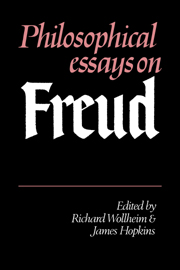Book contents
- Frontmatter
- Contents
- Introduction: philosophy and psychoanalysis
- 1 Conversations on Freud; excerpt from 1932–3 lectures
- 2 Freud, Kepler, and the clinical evidence
- 3 Critical empiricism criticized: the case of Freud
- 4 Freudian commonsense
- 5 Disposition and memory
- 6 On Freud's doctrine of emotions
- 7 The id and the thinking process
- 8 The bodily ego
- 9 Norms and the normal
- 10 On the generation and classification of defence mechanisms
- 11 Models of repression
- 12 Mauvaise foi and the unconscious
- 13 Self-deception and the ‘splitting of the ego’
- 14 Freud's anthropomorphism
- 15 Freud's anatomies of the self
- 16 Motivated irrationality, Freudian theory and cognitive dissonance
- 17 Paradoxes of irrationality
- Works of Freud cited
- Select bibliography
6 - On Freud's doctrine of emotions
Published online by Cambridge University Press: 01 October 2009
- Frontmatter
- Contents
- Introduction: philosophy and psychoanalysis
- 1 Conversations on Freud; excerpt from 1932–3 lectures
- 2 Freud, Kepler, and the clinical evidence
- 3 Critical empiricism criticized: the case of Freud
- 4 Freudian commonsense
- 5 Disposition and memory
- 6 On Freud's doctrine of emotions
- 7 The id and the thinking process
- 8 The bodily ego
- 9 Norms and the normal
- 10 On the generation and classification of defence mechanisms
- 11 Models of repression
- 12 Mauvaise foi and the unconscious
- 13 Self-deception and the ‘splitting of the ego’
- 14 Freud's anthropomorphism
- 15 Freud's anatomies of the self
- 16 Motivated irrationality, Freudian theory and cognitive dissonance
- 17 Paradoxes of irrationality
- Works of Freud cited
- Select bibliography
Summary
Talk of a summary kind about Freud has for its byword the claim that unconscious items and processes dominate psychic life. Such talk is of course likely to go farther: due to the unconscious we are creatures curiously heedless of time, creatures fixed in our early if not earliest ways. The unconscious, to put it dramatically, first maddens us and then keeps us mad. Among its achievements are these: we try to gratify wishes that are opposed to each other, indeed wishes whose descriptions may be paradoxical; we mistake as meaningless what is intelligible, and as trivial the important and even portentous; we confuse the scope and character of our acts and intentions; our denials can often be better understood as affirmations, and often too, the converse obtains; again more or less unbeknownst to us, our lives are largely spent in the quest and avoidance of persons and experiences past, in pursuit of and flight from an array of surrogates for those persons and experiences, including even antithetical surrogates. Then, too, prominent if not paramount in any résumé of Freud's thought will be statements about his extensions of commonplace notions of sexuality; that among unconscious entities those which enjoy pride of place and power are dispositions to affects or emotions that derive from early erotic experiences and fantasies. Any adequate abstract of Freud's work will also observe that, according to him, everyone is either neurotic or troubled by neurotic tendencies for some appreciable phase or phases of his life.
- Type
- Chapter
- Information
- Philosophical Essays on Freud , pp. 92 - 105Publisher: Cambridge University PressPrint publication year: 1982
- 3
- Cited by



